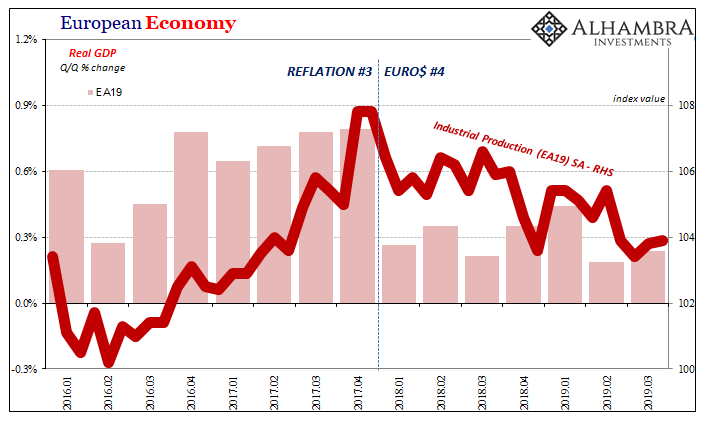From Alhambra Investments:
Eurostat confirmed earlier today that
Europe has so far avoided recession. At least, it hasn’t experienced
what Economists call a cyclical peak. During the third quarter of 2019,
Real GDP expanded by a thoroughly unimpressive +0.235% (Q/Q). This was a
slight acceleration from a revised +0.185% the quarter before.
The real question, though, is whether
the business cycle approach means anything in this day and age. I don’t
think it does, and that’s a big part of why there’s so much confusion
about both cause and effect.
For most people, certainly every
monetary policymaker and central banker around Frankfurt, the more
important number is 26. As in, Real GDP across all of the nineteen
countries of the Euro Area has been positive for twenty-six straight
quarters. It’s a seemingly impressive run of now six and a half years.
Mario Draghi has taken full credit for this, beginning long before he retired recently.
But upon closer examination you can see
how something is just not right. Recession is the wrong bogeyman to
focus on. There are, actually, much bigger problems and concerns hidden
within these figures which remain on the plus side of zero. These are
obscured because of the way in which we measure “expansion”, in linear
terms.
First, though, the cause. US President
Trump beginning to talk seriously about imposing tariffs on Chinese
goods in the middle of 2018 cannot ever explain why the economy for
nearly all of Europe clearly ran into a wall at the end of 2017.
Economists, including those in Europe and at Europe’s central bank, have
tried very hard to blame if not directly those trade tariffs then trade
war and general protectionist sentiment.
According to their view, because we all
know it cannot possibly be a global monetary problem, not with so much
global QE’s and “money printing”, German and Italian industrial firms
must have been worried about an issue that hadn’t yet been raised and so
began cutting scaling back for a far distant future event that didn’t
actually concern them. Yeah, it doesn’t come close to adding up.
No, what changed right at the outset of
2018 was the euro – meaning the dollar. The early warning signs of late
2017 were swallowed up by the inflation hysteria sweeping the globe,
especially in Europe, where it was said recovery had been found at long
last. Mario Draghi most of all.
While he was saying it, though, the
economy fell out right from beneath his feet. It didn’t lead to the
mainstream view of recession, several negative quarters of GDP, but it
has added up to something like that already. With these new figures in
hand, that’s seven quarters and counting of…something.
Here’s what I mean:
Not only did the underlying financial
circumstances change, they did so in economic circumstances going right
through the industrial sector.
...
MUCH MORE
